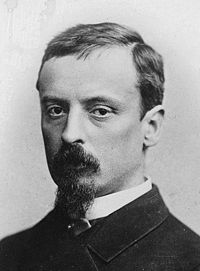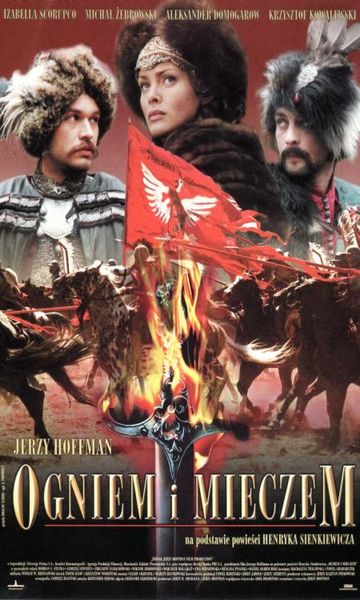Henryk Sienkiewicz – Required Reading Posted by Anna on Jun 18, 2008 in Culture
 Lately I have been hearing a lot about what it means to be Polish. It seems to be a trendy discussion topic, both among my countrymen and foreign expats living in Poland. And while neither side can agree on what exactly characterizes a typical Pole, they are both of the same opinion when it comes to pride. Polish people are fiercely proud of being Polish. We’re proud of our history, culture, language, food, music, country, weather, alcoholic beverages and everything in between. Where that pride comes from, I’m not really sure. But in order to try to understand what it means, you need to take a closer look at the thick volumes of Henryk Sienkiewicz.
Lately I have been hearing a lot about what it means to be Polish. It seems to be a trendy discussion topic, both among my countrymen and foreign expats living in Poland. And while neither side can agree on what exactly characterizes a typical Pole, they are both of the same opinion when it comes to pride. Polish people are fiercely proud of being Polish. We’re proud of our history, culture, language, food, music, country, weather, alcoholic beverages and everything in between. Where that pride comes from, I’m not really sure. But in order to try to understand what it means, you need to take a closer look at the thick volumes of Henryk Sienkiewicz.
You might have heard of him, he’s the guy who wrote “Quo Vadis”. Yep, the same “Quo Vadis” that in the 1950s was adapted into a movie with Deborah Kerr, Peter Ustinov and a whole bunch of other stars. Actually, “Quo Vadis” has been turned into several film versions, including a couple of silent ones, in addition to just about everything else – stage plays, TV miniseries, and even an opera.
This book has definitely contributed to Mr. Sienkiewicz’s Nobel Prize for literature in 1905, which he got for his “outstanding merits as an epic writer”. There are other Poles that also got the prize – Władysław Reymont in 1924, Czesław Miłosz in 1980 and Wisława Szymborska in 1996, but we’ll talk about them another time.
I have to admit, I was never a fan of Sienkiewicz. Unfortunately, my mother was, and as such, I was exposed to his works through osmosis. And his works were indeed ginormous. The dude specialized in historical fiction and liked his stories in threes. Actually, his crown achievement (other than “Quo Vadis” naturally) is known as The Trilogy (Trylogia in Polish)
 The first book in The Trilogy, “With Fire and Sword” (in Polish “Ogniem i mieczem”) is set in the Polish-Lithuanian Commonwealth during the 17th century, and the historical events it mentions are real. However, the main plot and characters in the story are fictitious. The book became a megahit in Poland when it was first released, and is the most beloved Polish novel of all times. It’s a tale of war and love and murders and passion and betrayal, and has been compared to a Polish-Ukrainian “Gone With The Wind”.
The first book in The Trilogy, “With Fire and Sword” (in Polish “Ogniem i mieczem”) is set in the Polish-Lithuanian Commonwealth during the 17th century, and the historical events it mentions are real. However, the main plot and characters in the story are fictitious. The book became a megahit in Poland when it was first released, and is the most beloved Polish novel of all times. It’s a tale of war and love and murders and passion and betrayal, and has been compared to a Polish-Ukrainian “Gone With The Wind”.
I must admit that as a high school student I found the book mind-boggingly boring. It was only after watching the 1999 film version by Jerzy Hoffman, I realized that maybe, just maybe, I should revisit the original work. I did, and it wasn’t half as bad as I remembered it from school. You can find the English version on-line here.
The other books in The Trilogy – “The Deluge” (“Potop” in Polish, about the Swedish invasion on Poland) and “Fire in the Steppe” (“Pan Wołodyjowski” in Polish, about wars with Turkey) were popular as well, but never reached the level of “With Fire and Sword”.
My personal favorite is “Fire in the Steppe”, also known under the alternate title of “Colonel Wołodyjowski”. Why I liked it? The TV mini-series starred Daniel Olbrychski as Azja Tuchaj-bejowicz. Azja was my favorite character (no doubt thanks to the outstanding acting skills of Mr. Olbrychski), and I remember crying into the pillow when he was getting impaled. (Hey! It’s a historical novel full of gory historical details! People did die in some pretty terrible ways back then.)
Now, as an adult, I understand the scope and vision of Mr. Sienkiewicz’s works much better. He wrote the novels during the time when Poland didn’t officially exist. By describing the glory days of a once powerful nation, he provided a glimmer of hope for the future. And nobody can make you feel as proud of being Polish as Henryk Sienkiewicz. And that’s a fact.

Build vocabulary, practice pronunciation, and more with Transparent Language Online. Available anytime, anywhere, on any device.




Comments:
Patricia Paczkowska:
“With fire and sword” is playing on TV now. In Poland. I can just make out the english under the polish narrator. I must rent the DVD.
mersin tüp bebek merkezi:
hello, beatiful site
tüp bebek:
Hello, beautiful site. Thank you.
Maciej:
Few people know that Sienkiewicz also wrote a few non hystorical novels. <a href="http://www.gutenberg.org/etext/11686"Without Dogma (Bez dogmatu) is one of them. Its main character, Leon Ploszowski, who calls himself a genius without portfolio, believes himself being marked by the improductivité slave, a feature that in his eyes is typical to the Polish. No wonder the book has never been as popular in Poland as The Trilogy: it doesn’t make a Pole feel very proud of being Polish (this may not be true in case of the Polish women).